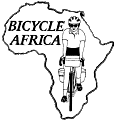
 |
Bicycle Africa |
![]()
DAILY ITINERARY / MAPS
Sierra Leone: Sahel Journey Itinerary
Sierra Leone Maps
MONEY
Final payment for the land portion is due 60 days before the start of the trip. Payment may be made by money order, personal, certified, cashier's check or credit card. If fewer than six people register for the program there is a supplement of $100. If this should turn out to be the case, the money is usually collected in cash at the beginning of the program.
Pocket money used during a two-week tour varies between individuals. Most people use about $100 plus or minus $50. Examples of expenses are lunch, drinks, postcards, postage, tips and laundry. NOT INCLUDED in this estimate are souvenirs and transportation, lodging and meals before and after the tour, which may be significant ($20-$60 per day). Now bring twice what you think you will need. You can bring any extra home.
You can change money at the airport. The best exchange rate is on crisp, new, large denomination bills (US$50 and $100 bills, or similar Euros). In rural areas you need small denominations of local currency to make your purchases.
The usefulness of credit card is extremely limited and not advised. Most ATMs in Sierra Leone aren't internationally linked. Pro-Credit Bank, a German based institution, has two locations where international ATM VISA-networks are available. Neither are convenient to the start of the tour.
Traveler Checks (T/C) have to be cashed at specific bank and big hotels and can be difficult and time consuming to cash. T/C are not advised. To cash T/Cs in Africa you sometimes need to show your "purchase record" receipts -- bring them, but pack them separately.
AIR TRAVEL
The program starts and end in Lungi. (You can store things at the hotel during the program.)
You are responsible for making you own arrangements to Sierra Leone and to the rendezvous point (instructions will be provided.) If you arrive anytime on or before "Day 1" of the program you won't miss any major scheduled activities. No major activities are scheduled on the final day of the program as well. Some people like to arrive early to have more time to adjust. If people have extra time before their departing flight they often use this for souvenir shopping or to visit a last museum or monument.
Some airlines charge a hefty fee for bikes-as-baggage on international flights ($300 roundtrip) and some charge nothing, if you are otherwise within your baggage allowance. You might want to take this into consideration when booking your flight. Folding bikes, like Bike Friday's, that fit in suitcases, generally circumvent all of these hassles.
Regardless of how you arrange to get to Africa, please tell us the airline, flight, date and time of your arrival in Sierra Leone.
IMMUNIZATIONS AND HEALTH
Required: yellow fever. Recommended: routine immunizations (tetanus-diphtheria, polio, measles), typhoid, hepatitis A, and meningococcal meningitis (selectively). It is recommended, but not required, that you start your shots 6 weeks before departing. Consult your physician or travel clinic for your specific needs.
Malaria is a serious health concern. We strongly suggest that you carry a mosquito net on this trip. Please ask your travel clinic or physician about prophylactics for chloroquin-resistant malaria and follow their instructions. See also "Equipment" below.
PACKING LIST/EQUIPMENT ADDENDUM
Appendix A and
the program packing list combined are
INSURANCE
Personal health insurance, travel, evacuation and baggage insurance is strongly recommended. Cycling and travel have inherent risks, and the world seems to be increasingly changeable. Even the most conscientious behavior does not guarantee against illness or injury. Insurance mitigates the unforeseen.
Medical insurance is not always valid in foreign countries. U.S. Medicare and Medicaid programs do not provide payment for medical services outside the United States. Doctors and hospitals often expect immediate cash payment for health services. Uninsured travelers who require medical care overseas may face extreme difficulties.
Please check with your own insurance company to confirm whether your policy applies overseas, the adequacy of coverage, including provision for medical evacuation, and whether payment will be made to the overseas hospital or doctor or if you will be reimbursed later for expenses that you incur. Serious medical problems requiring hospitalization and/or medical evacuation to your home country can cost tens of thousands of dollars. Some credit cards include travel insurance when you use them to purchase an airline ticket.
Useful information on medical emergencies abroad is provided in the Department of State's Bureau of Consular Affairs brochure, "Medical Information for Americans Traveling Abroad," available via the Bureau of Consular Affairs home page or auto-fax: 1-202-647-3000.
APPLYING FOR VISAS
Visa requirements differ by nationality and the embassy you are apply at, and can change without notice. Contact the embassy you will be applying at for the latest information. At last check: Sierra Leone requires U.S., Canadian and EU citizens to have a visa. Application are available online. DON'T APPLY MORE THAN THREE MONTH BEFORE YOU WILL ARRIVE. Send your passport, application, payment and other materials directly to the embassy. You must arrange for the return postage. It's recommended that you send a self-addressed, prepaid, trackable, express mail envelope.
REQUIREMENTS FOR VISA TO ENTER Sierra Leone
Visas are available from:
BIBLIOGRAPHY - Africa Booklist
ETCETERA
Please let me know if you have any questions.
![]()